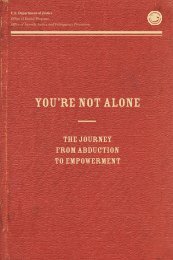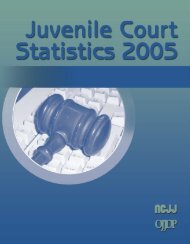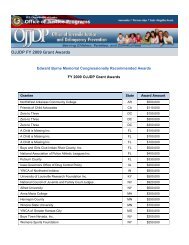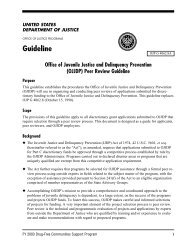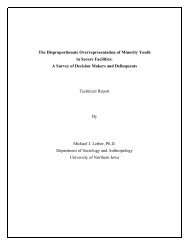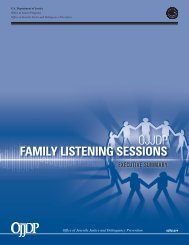OJJDP National Conference Program - Office of Juvenile Justice ...
OJJDP National Conference Program - Office of Juvenile Justice ...
OJJDP National Conference Program - Office of Juvenile Justice ...
You also want an ePaper? Increase the reach of your titles
YUMPU automatically turns print PDFs into web optimized ePapers that Google loves.
AGENDA: WEDNESDAY, OCTOBER 12Wednesday, October 12, 2:00 p.m. – 3:30 p.m.(continued)Taking an Evidence-Based Approach to Everyday<strong>Juvenile</strong> <strong>Justice</strong> Practice (Track: Reconstructingthe Ivory Tower)Chesapeake J–LMark Lipsey, Peabody Research Institute, Vanderbilt UniversityJames C. Howell, The Comprehensive Strategy GroupSusan Terrell Whitten, North Carolina Department <strong>of</strong> <strong>Juvenile</strong><strong>Justice</strong> and Delinquency PreventionModerator: Shay Bilchik, Georgetown Public Policy Institute,Georgetown UniversityPresenters will discuss a new, comprehensive approach toevidence-based practice that provides a practical meansto translate extensive research about the effectiveness <strong>of</strong>juvenile justice programs into improved everyday juvenilejustice practice. Embedding this approach within <strong>OJJDP</strong>’sComprehensive Strategy for Serious, Violent, and Chronic<strong>Juvenile</strong> Offenders allows efforts to be focused on identifyinga sufficient array <strong>of</strong> programs; matching youth to appropriateservices, based on risk and need; and evaluating servicesto determine if they reduce juvenile recidivism rates andimprove outcomes.3:45 P.M. – 5:15 P.M. BREAKOUT SESSIONSWorkshopsSerious Adolescent Offenders Moving Into Adulthood:Life Events and the Role <strong>of</strong> Deterrence<strong>National</strong> Harbor 4–5Edward P. Mulvey, Western Psychiatric Institute and Clinic,University <strong>of</strong> Pittsburgh School <strong>of</strong> MedicineThomas Loughran, Department <strong>of</strong> Criminology and Criminal<strong>Justice</strong>, University <strong>of</strong> MarylandJoseph J. Cocozza, <strong>National</strong> Center for Mental Health and<strong>Juvenile</strong> <strong>Justice</strong>Moderator/Presenter: Carol A. Schubert, Western PsychiatricInstitute and Clinic, University <strong>of</strong> Pittsburgh School <strong>of</strong> MedicineIn this research-to-practice presentation, speakers willdiscuss findings from the Pathways to Desistance study,a multisite, longitudinal study <strong>of</strong> serious adolescent<strong>of</strong>fenders, and will suggest ways that practitioners can usethis information when developing evidence-based approachesto work with these youth. The panel will describe youth<strong>of</strong>fending patterns during the 7-year period when they movefrom adolescence to early adulthood and the differencesamong subgroups <strong>of</strong> youth who follow different patterns <strong>of</strong>antisocial behavior. A juvenile justice practitioner will discussthe implications <strong>of</strong> this research for the field.Creating Conditions for Learning: StoppingSchool Dropouts and Improving Graduation Rates(Track: Truancy and Dropping Out)<strong>National</strong> Harbor 10Jonathan Cohen, <strong>National</strong> School Climate CouncilKen Seeley, <strong>National</strong> Center for School EngagementModerator: Bill Modzeleski, U.S. Department <strong>of</strong> EducationThis session will focus on current research and practicesregarding school climate, school engagement, and the creation<strong>of</strong> learning conditions that promote high school graduation.The session will feature the <strong>National</strong> School ClimateStandards and discuss how local educators can use them toimprove school engagement. In addition, the workshop willhighlight the Council’s resource center, provide an overview<strong>of</strong> its materials on best practices and research-based strategies,and summarize the latest research on connectionsamong bullying, truancy, delinquency, and engagement. It willalso focus on creating conditions that can improve outcomesfor at-risk youth.Safety, Fairness, and Stability: Strengthening theEngagement <strong>of</strong> Families Across Systems<strong>National</strong> Harbor 12–13Diana Denboba, Maternal and Child Health Bureau, U.S.Department <strong>of</strong> Health and Human ServicesNora Wells, Family VoicesBill Heberle, Missouri Division <strong>of</strong> Youth ServicesJudge Ernestine Gray, Orleans Parish <strong>Juvenile</strong> Court, LouisianaModerator/Presenter: Shay Bilchik, Georgetown UniversityThe panelists—youth and family representatives andpractitioners—will describe their experiences in constructingpartnerships to improve the well-being <strong>of</strong> children and families.The panel will highlight improvements that the Children’sBureau, <strong>OJJDP</strong>, the Substance Abuse and Mental HealthServices Administration, and the U.S. Department <strong>of</strong> Educationare considering when they partner with families. The panelistswill discuss their work, which has engaged youth and theirfamilies as essential partners and has built upon what hastaken place in the special and mental health systems <strong>of</strong> care.Participants can expect to deepen their understanding <strong>of</strong> theprinciples and practices that actively engage young people andfamily members in their institutional work.<strong>Juvenile</strong>s and Hate Crime: Toward PreventingPerpetration and VictimizationPotomac 1–3Michael Lieberman, Anti-Defamation LeagueTy Cobb, Human Rights CampaignAlice Cahn, Cartoon NetworkModerator: Karen J. Bachar, <strong>OJJDP</strong>Children are not born hating others; however, the attitudesand beliefs that promote hate-related speech and behaviors14



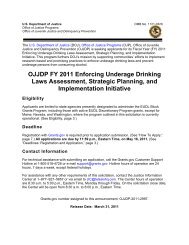
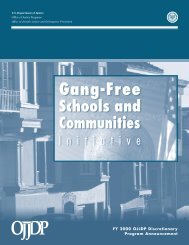
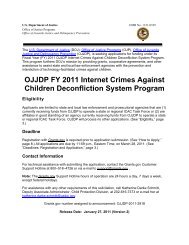
![Chapter 5 [PDF] - Office of Juvenile Justice and Delinquency ...](https://img.yumpu.com/46584340/1/190x245/chapter-5-pdf-office-of-juvenile-justice-and-delinquency-.jpg?quality=85)

